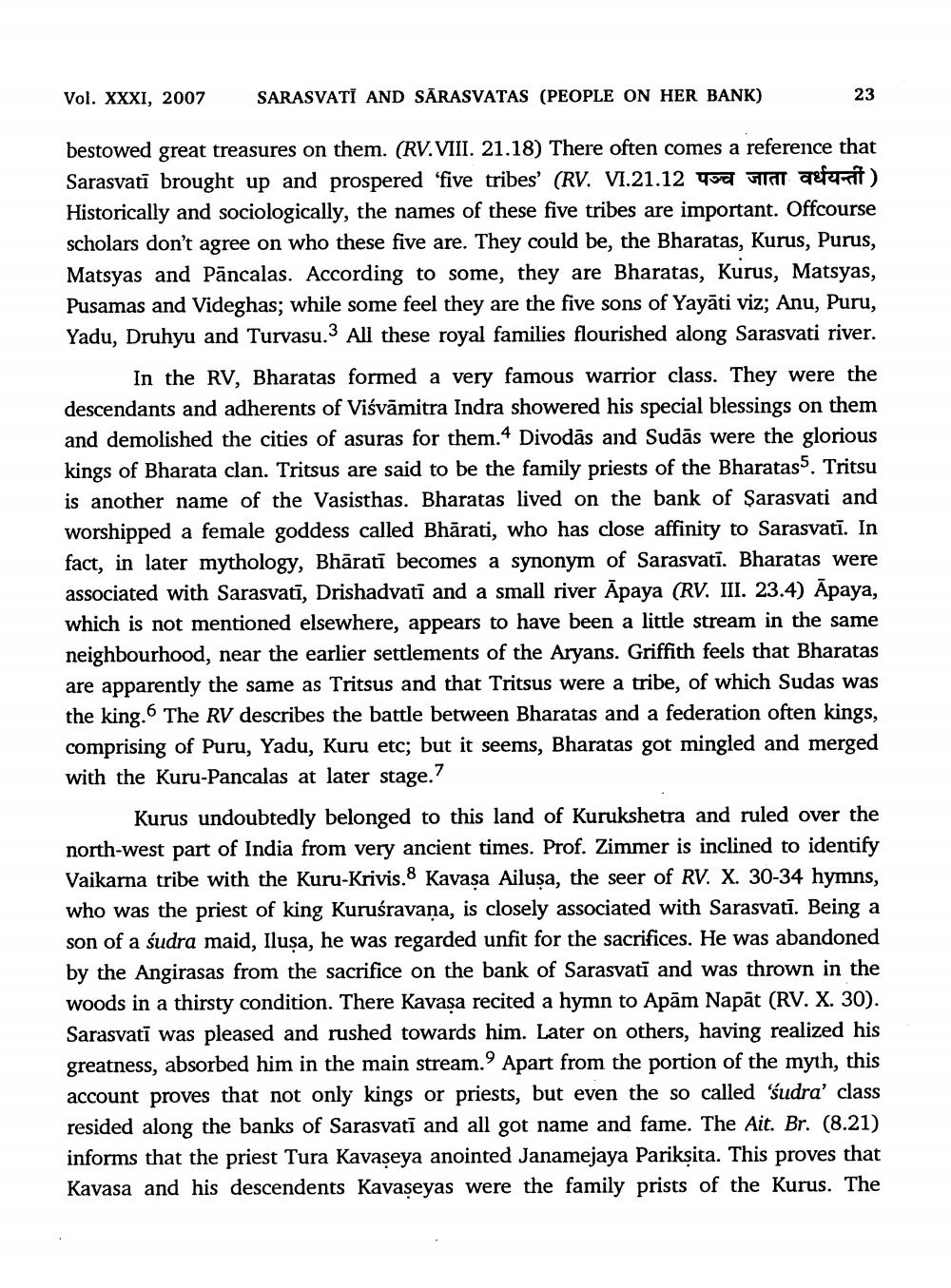________________
Vol. XXXI, 2007
SARASVATI AND SARASVATAS (PEOPLE ON HER BANK)
bestowed great treasures on them. (RV. VIII. 21.18) There often comes a reference that Sarasvati brought up and prospered 'five tribes' (RV. VI.21.12 ft) Historically and sociologically, the names of these five tribes are important. Offcourse scholars don't agree on who these five are. They could be, the Bharatas, Kurus, Purus, Matsyas and Pancalas. According to some, they are Bharatas, Kurus, Matsyas, Pusamas and Videghas; while some feel they are the five sons of Yayāti viz; Anu, Puru, Yadu, Druhyu and Turvasu.3 All these royal families flourished along Sarasvati river.
23
In the RV, Bharatas formed a very famous warrior class. They were the descendants and adherents of Viśvāmitra Indra showered his special blessings on them and demolished the cities of asuras for them.4 Divodās and Sudãs were the glorious kings of Bharata clan. Tritsus are said to be the family priests of the Bharatas5. Tritsu is another name of the Vasisthas. Bharatas lived on the bank of Sarasvati and worshipped a female goddess called Bharati, who has close affinity to Sarasvati. In fact, in later mythology, Bhāratī becomes a synonym of Sarasvati. Bharatas were associated with Sarasvati, Drishadvatī and a small river Apaya (RV. III. 23.4) Apaya, which is not mentioned elsewhere, appears to have been a little stream in the same neighbourhood, near the earlier settlements of the Aryans. Griffith feels that Bharatas are apparently the same as Tritsus and that Tritsus were a tribe, of which Sudas was the king.6 The RV describes the battle between Bharatas and a federation often kings, comprising of Puru, Yadu, Kuru etc; but it seems, Bharatas got mingled and merged with the Kuru-Pancalas at later stage.7
Kurus undoubtedly belonged to this land of Kurukshetra and ruled over the north-west part of India from very ancient times. Prof. Zimmer is inclined to identify Vaikamna tribe with the Kuru-Krivis.8 Kavaşa Ailusa, the seer of RV. X. 30-34 hymns, who was the priest of king Kuruśravana, is closely associated with Sarasvati. Being a son of a sudra maid, Ilusa, he was regarded unfit for the sacrifices. He was abandoned by the Angirasas from the sacrifice on the bank of Sarasvati and was thrown in the woods in a thirsty condition. There Kavaşa recited a hymn to Apām Napät (RV. X. 30). Sarasvati was pleased and rushed towards him. Later on others, having realized his greatness, absorbed him in the main stream. Apart from the portion of the myth, this account proves that not only kings or priests, but even the so called Sudra' class resided along the banks of Sarasvati and all got name and fame. The Ait. Br. (8.21) informs that the priest Tura Kavaşeya anointed Janamejaya Parikṣita. This proves that Kavasa and his descendents Kavaṣeyas were the family prists of the Kurus. The
9




